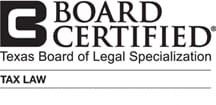The Houston law firm of Robert M. Mendell, Attorney at Law, P.C. has substantial expertise in the areas of business mergers, acquisitions, divestitures, conversions, tax-free reorganizations, and other business combinations, sales, purchases, and divisions.
The Negotiation Stage of the Business Acquisition Involves Both Tax and Non-Tax Considerations
In negotiating the purchase or sale of a business, many non-tax considerations are usually considered and agreed to by the buyer and the seller aside from the obvious amount and payment terms of the purchase price.
Such matters may include, as examples:
- Whether any personal guarantees are to be required of the buyer in the event of seller financing of all or a portion of the purchase price,
- Whether, in the event of seller financing, any assets of the purchased business or other assets of the buyer are to be used as collateral by the seller,
- The contents of warranties and representations and the consequences of any violation of a warranty or representation, including whether a right of offset will be granted,
- Confidentiality provisions,
- The provision or non-provision for a deal-breakup fee,
- Whether legal opinions will be required,
- The establishment of contingencies on deferred payments to the seller, including the parameters of any "earn-out" provision,
- The restrictions on seller's conduct pending closing,
- The length of the survival period for warranties and representations,
- The specific delineation of employment or consulting agreement terms for any continuing involvement of seller after closing,
- The contents of restrictive covenant provisions such as covenants not to compete and nonsolicitation restrictions, and
- The "basket" and "ceiling" amounts for indemnification for breach of seller's warranties and representations.
An experienced and knowledgeable mergers and acquisitions attorney can help obtain more favorable terms and conditions for the client in connection with the myriad of business points and issues involved in any substantial business sale or purchase.
The income tax implications of the contemplated business acquisition should be carefully considered. Sellers organized as C corporations often need special structuring of the sale transaction in order to avoid a double tax. Among other techniques that might be considered, allocation of part of the purchase price to personal goodwill of the seller's owners may solve or lessen a double taxation situation under the right circumstances.
Engagement of an experienced mergers and acquisitions lawyer, with additional expertise in tax law, can be very important when considering the important tax implications involved in any substantial business sale or purchase.
Robert M. Mendell, with over 35 years experience, is an experienced mergers and acquisitions attorney and is an Attorney CPA and a Board Certified Tax Attorney.
Many or most of the key tax and non-tax considerations can be set forth and agreed to in a preliminary document often referred to as a Letter of Intent.
- Business Acquisitions Seminar Handout.
- List of Business Acquisitions Seminars Presented by Robert M. Mendell.
- Article: "Negotiating the Business Acquisition in a Buyer's Market"
Due Diligence Process; Provision Of Information; Third-Party Consents
After preliminary agreement by the parties usually in the form of a Letter of Intent, the merger and acquisitions attorneys for both sides will be involved in the due diligence process and in negotiating and drafting the final definitive agreements for closing. Legal counsel for seller will usually be involved in organizing and presenting key seller information to buyer's legal counsel in a fashion suitable for attachment to the final definitive agreements. Great care should be taken in providing such information as such information will often constitute a substantial portion of seller's warranties and representations in the transaction.
Oftentimes, actions or consents of third parties may be required to properly accomplish the transfer of the business from the seller to the buyer. Early initiation of all matters involving third party action or consent is imperative with respect to a timely closing. Third party action or consent is often involved where there are third party liens that need to be released, real estate leases to be assumed, or customer/vendor/franchisor/licensor agreements to be assigned. Title policy commitments and UCC searches should be obtained early with respect to any real estate or personal property or equipment to be acquired in the transaction in case various steps need to be taken to clear title to these assets. All environmental studies, structural inspections, and heavy equipment testing should be accomplished early, as well.
An experienced mergers and acquisitions attorney can be instrumental in all of these activities to help ensure that clear title passes from seller to buyer and that parties are protected by providing proper information supporting warranties and representations of the parties, particularly the seller.
Other Closing Documents
Aside from the definitive basic agreement, usually in the form of an asset purchase agreement, a stock purchase agreement, or a merger or conversion agreement, there are other numerous important legal documents associated with the business acquisition.
There may be various documents relating to title of the purchased assets and the release or assumption of prior liens, such as bills of sale, warranty deeds, releases of liens and UCC-3 termination statements. In the case of a seller financed or leveraged buyout transaction, there may be various documents evidencing seller's right to deferred payments, such as promissory notes, security agreements, deeds of trust, UCC-1 financing statements, and/or guarantee agreements.
In connection with leased assets, there may be lease agreements, estoppel certificates from existing landlords, and assignments of leases, including landlord consents. For intellectual property rights, there may be patent assignments and license agreements to be obtained. Oftentimes, there are restrictive covenant agreements, providing for covenants not to compete and nonsolicitation prohibitions, as well as employment agreements and/or consulting agreements, whereby the seller, or individuals affiliated with the seller, continue to work for, and receive payments from, the buyer in the future.
The contents of any "earnout" agreements, usually evidencing the parameters of conditional additional consideration to be paid to seller upon achievement of certain goals, must be drafted precisely and with care, as well. Any provision for personal goodwill, providing substantial tax savings for the seller under the right circumstances, must be properly included within the definitive agreements by the mergers and acquisitions attorneys representing the parties in the transaction.





